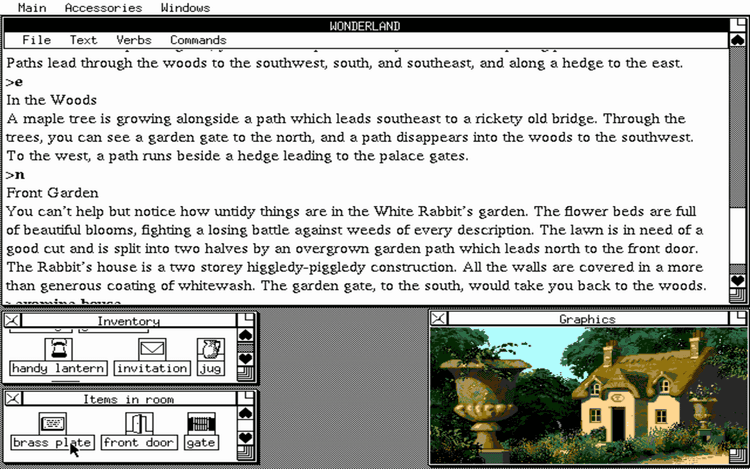
Wonderland is a text-driven adventure game from Magnetic Scrolls, published by Virgin Games, that invites you to guide Alice through a whimsical realm of logic-twisting puzzles and unforgettable characters. This interactive fiction game blends a smart parser with evocative visuals, encouraging careful observation and playful experimentation. Fans of Zork and The Hitchhiker’s Guide to the Galaxy will appreciate its witty prose, layered challenges, and satisfying “aha” moments. Designed for timeless enjoyment, it’s easy to play online and to revisit whenever the urge for a clever, story-rich game strikes. Explore, experiment, and outthink Wonderland’s delightful absurdities.
Wonderland stands as Magnetic Scrolls’ most expansive journey into interactive fiction, a playful and sophisticated adventure that marries literary whimsy with thoughtful game design. Published by Virgin Games, the experience channels the spirit of Lewis Carroll while asserting a distinct voice—smart, self-assured, and packed with puzzles that reward imagination as much as logic. Released for DOS alongside other contemporary platforms, this game earned a reputation for welcoming newcomers to the parser-led format without compromising depth for veterans. Its prose is vivid, its tone mischievous, and its challenges consistently fair, a combination that has helped it remain engaging across generations.
One of the most striking qualities of Wonderland is how it invites you to interact. Magnetic Scrolls’ bespoke interface, often referred to as Magnetic Windows, arranges the adventure into movable, resizable panes. Text, location illustrations, maps, inventory, and context-sensitive menus flow together in a way that makes command entry feel natural. If you enjoy typing expressive sentences to the parser, you can; if you prefer to construct commands through menus, that’s seamless, too. This flexible approach lets the game gently teach the language of interactive fiction, ensuring that exploration never becomes a chore and that the joy of discovery remains front and center.
Wonderland’s best moments occur when curiosity meets craft. The puzzles are rarely about brute-force verb hunting; they are conversations with the world. A quirky character might drop an odd hint, a piece of scenery could conceal an unexpected use, or a familiar item may behave differently under Wonderland’s unpredictable logic. The solutions feel earned because they align with the story’s internal rules—whimsical, yes, but consistent. Failures are educational rather than punitive: the prose nudges you toward better questions, and that incremental understanding becomes its own reward. As with the most beloved adventures, you’ll come away with stories about the one riddle that stumped you until a sudden connection snapped everything into place.
While rooted in Carroll’s universe, the game is not a straight retelling. It uses Wonderland as a living setting, one where characters like the Mad Hatter, the Duchess, and the Queen of Hearts become puzzle partners as much as narrative figures. Descriptions are rich with detail that matters, guiding your eye—and your parser—toward the verbs and nouns that make progress possible. The writing is playful without being opaque, witty without undercutting tension. You’ll encounter wordplay, spatial trickery, and objective juggling, yet it’s all anchored by a coherent sense of place that keeps the adventure tangible rather than abstract.
Though the heart of Wonderland is text, its still images and interface embellishments enhance immersion instead of distracting from it. The art frames each scene like a storybook panel, offering cues about scale, orientation, and objects worth examining. In tandem with the windowed interface, these visuals make the world feel tactile. They establish mood, reinforce narrative beats, and, crucially, help you form hypotheses. When a picture hints that something is just out of reach, you’ll start brainstorming tools, allies, or lateral moves that might bring it close.
The game respects your time. Clues surface organically through description, character dialogue, and environmental feedback. The parser is forgiving, accommodating reasonable synonyms and phrasing so that you spend energy solving rather than wrestling with vocabulary. As you progress, the structure unveils itself: motifs recur, puzzle chains interlock, and the overall arc builds from gentle curiosity to confident mastery. Every solved obstacle slightly widens your toolkit and understanding, and that cumulative momentum propels you through the later, more intricate sequences.
Wonderland adapts beautifully to modern, browser-based play, making it easy to revisit or discover for the first time. You can play Wonderland online free, directly in a browser, without installing anything. The interface translates well to mobile devices, too, so you can enjoy the full adventure on phones and tablets without restrictions. The text and windowed layout remain readable and responsive, allowing comfortable sessions whether you’re at a desk or on the go. This frictionless accessibility highlights how timeless the design truly is: great writing and thoughtful puzzles never go out of style.
If you relish narrative-driven games where words are as powerful as weapons, Wonderland is for you. It’s ideal for players who like to map spaces in their heads, track character quirks, and look for meaning in the smallest descriptive detail. Fans of interactive fiction classics will appreciate its craft, while adventure newcomers will find its interface and tone welcoming. Crucially, the game remains replayable: different approaches to scenes, alternate puzzle orders, and the simple pleasure of revisiting favorite passages make it a world worth returning to.
Wonderland succeeds because it treats language as both lens and lever. By blending a flexible parser, elegant windowed presentation, evocative art, and puzzles that play fair, it achieves a rare balance between accessibility and depth. To control the game, type natural commands—short verbs like LOOK, TAKE, EXAMINE, TALK, and USE with sensible nouns—or compose actions from on-screen menus when available. Navigation and interaction also respond well to standard directional inputs and mouse clicks where supported. Together, these methods keep you immersed in the rhythm of reading, reasoning, and delightfully surprising yourself.
All used codes are publicly available and the game belongs to its original authors.
Share game
Share game




Share game